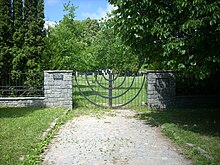Jihlava Jewish Community
The first Jewish community in Jihlava (German Iglau ), a Czech town in Okres Jihlava in the Vysočina region , was founded in the Middle Ages .
history
Jews were first mentioned in Iglau in the middle of the 13th century. In a document belonging to the city charter, the Statuta Judaeorum of Otakar II , the rights and obligations of the Jewish population were laid down in 32 articles.
In the 14th century, the settlement of Jewish families was encouraged by Margrave Karl, who later became Emperor Charles IV . He hoped that this would generate economic impetus for the region. The Jewish families lived in Judengasse in the west of the city, where they also set up a synagogue .
Unlike in most cities in Central Europe, the Jews in Iglau were not persecuted during the plague of 1348/49 . The sovereign granted them security of life and property and after the great city fire of 1353 temporarily released them from the tax burden.
With the increasing indebtedness of Christian city-dwellers, who accused their Jewish creditors of usury , the relationship between Jews and Christians in the city changed. The Jews had to leave the city in 1426 and renounce their homes and debt claims. The synagogue was converted into a Christian chapel. The expelled Jews settled in neighboring towns such as Pullitz , Puklitz , Pirnitz and Triesch .
It was not until the end of the 18th century that some privileged Jewish families were given the right to settle in Iglau again.
After 1848, more and more Jews from the surrounding area moved to Iglau, which allowed the Jewish community to flourish. In the industrially up-and-coming city, Jewish merchants achieved prosperity and prestige in the decades that followed. The Jewish community was officially constituted in 1863. The first rabbi from 1860 was Joachim Jakob Unger (1826–1912), who worked here for more than 50 years.
time of the nationalsocialism
After the so-called Sudeten crisis in autumn 1938, there was the first large movement of refugees from Jihlava Jews. Fearing a possible German occupation, they fled to the Czech heartland. At the same time, Jewish refugees from the Sudeten German areas came to the city.
With the German occupation from mid-March 1939, the systematic disenfranchisement of the Jewish population began. Jewish shops were looted and a fire was set in the synagogue. She burned out completely. The ceremonial hall in the Jewish cemetery was also set on fire.
In 1940 some of the Jihlava Jews were forced to leave the city and look for accommodation in the surrounding villages. The so-called Aryanization was almost complete by this time.
From 1941 onwards, all Jews, with the exception of those living in so-called mixed marriages , were expelled from Iglau or deported to Theresienstadt .
Immediately after the end of the war, a Jewish community was founded again, which was given up a little later.
On the city wall, near the market, a plaque commemorates the hundreds of victims of the Holocaust from Jihlava.
Community development
| year | Jews |
|---|---|
| 1837 | 17 people |
| 1848 | 99 people |
| 1857 | 221 people |
| 1869 | 1090 people (around 5% of the population) |
| 1880 | 1415 people (around 6.3% of the population) |
| 1890 | 1497 people |
| 1900 | 1450 people |
| 1921 | 1180 people |
| 1930 | 1025 people (around 3% of the population) |
| 1938 | around 700 people |
| Dec 1941 | about 25 people |
synagogue
graveyard
literature
- Klaus-Dieter Alicke: Lexicon of the Jewish communities in the German-speaking area. Volume 2: Großbock - Ochtendung. Gütersloher Verlagshaus, Gütersloh 2008, ISBN 978-3-579-08078-9 ( online edition ).


